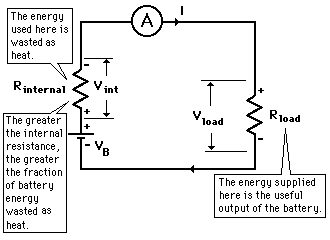Auto Battery Output
 |
The existence of internal resistance in an auto battery limits the output power. The effect can be very drastic on a low resistance load like a starter. Its effect on an intermediate resistance load like the headlights is less pronounced, and you may not even detect a problem in the operation of high resistance loads like a radio. Change resistances or battery voltage to explore their effects. |
The values for battery voltage, load resistance, and internal resistance may be changed in the exploratory calculation below. Default values will be entered for any one of those values left unspecified, typical of the battery example, but any of those values may be changed.
DC Circuits
Practical circuit concepts